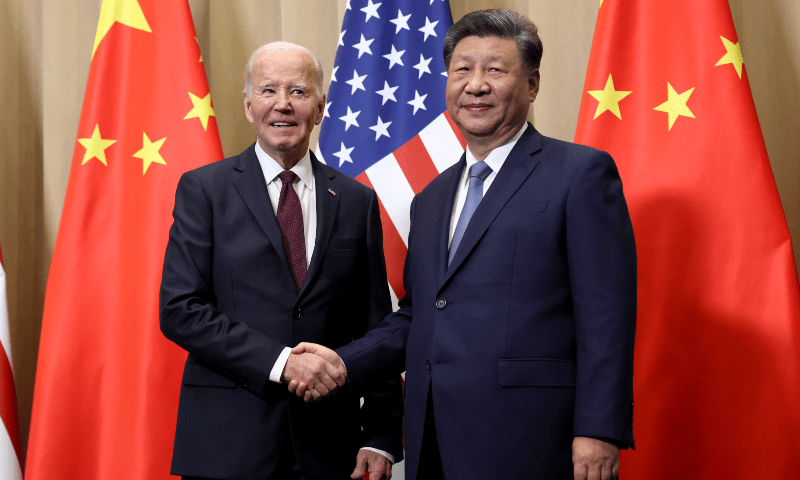Introduction
In a landmark agreement during their meeting at an Asia-Pacific summit in Lima, US President Joe Biden and Chinese President Xi Jinping made a significant pledge regarding the control over nuclear weapons. Both leaders agreed that decisions surrounding the use of nuclear weapons must remain in human hands, rather than being influenced by artificial intelligence (AI). This discussion highlights the delicate balance both nations must maintain in managing nuclear risks while navigating the technological advancements in AI.
Key Takeaways from the Meeting
The main topic of their discussion centered on the potential dangers of AI in military decision-making, particularly concerning nuclear weapons. Biden and Xi emphasized the necessity of maintaining human control over nuclear launch decisions. Furthermore, they acknowledged the need for responsible development of AI technologies in military applications, underscoring their commitment to preventing the loss of human oversight in such critical matters.
The agreement marks a significant first step between the two global powers in addressing concerns about AI and nuclear weapons, areas where diplomatic progress has been difficult to achieve in recent years. With AI technologies advancing rapidly, both the US and China face the challenge of regulating their military uses while mitigating risks that could arise from autonomous systems.
Human Control Over Nuclear Weapons
Importance of Human Oversight in Military Decisions
Nuclear weapons, with their devastating potential, are perhaps the most critical area where human oversight is paramount. The risk of an AI making an autonomous decision to launch a nuclear strike is not just a technical issue but a moral and strategic one. Biden and Xi both recognized that the use of such weapons should never be left to AI systems, whose actions may lack the nuanced understanding required for decisions with global consequences.
The two leaders highlighted the potential risks associated with AI, particularly in military fields. AI, while providing various advantages such as speed and data processing capabilities, lacks the ethical judgment and situational awareness that human decision-makers possess. This is especially important in the realm of nuclear warfare, where the wrong decision could have catastrophic results.
Prudent Development of AI in Military Use
Alongside the commitment to maintain human control, Biden and Xi stressed the need for responsible AI development in the military. Both nations, as major global powers, are at the forefront of AI research. However, the rapid pace of development in AI brings forth questions regarding accountability and ethical considerations in warfare.
In their meeting, Biden and Xi agreed on the necessity of establishing clear guidelines for AI’s use in military contexts. These guidelines would ensure that AI technology is developed and deployed with caution, preventing it from being integrated into systems that could lead to unintended escalations or misjudgments, especially in critical areas like nuclear weapons management.
Nuclear Arms Control: A Stalled Conversation
Despite the landmark agreement on AI, discussions surrounding nuclear arms control between the US and China remain stalled. Official-level talks over nuclear arms resumed briefly in November, but they have since slowed down. While both countries have expressed concerns about each other’s nuclear arsenals, particularly China’s rapid expansion, formal arms control negotiations are not expected in the immediate future.
The US Department of Defense estimates that China currently possesses around 500 operational nuclear warheads, a number that is expected to surpass 1,000 by 2030. This compares to the approximately 1,770 warheads deployed by the US and 1,710 by Russia. The Pentagon has also raised concerns about the readiness levels of China’s nuclear arsenal, projecting that a significant portion of its warheads may be kept at higher readiness levels by the end of the decade.
While China maintains a no-first-use policy and advocates for a minimal deterrence strategy, it has not formally detailed its nuclear arsenal. This lack of transparency has raised concerns among other nations, particularly regarding China’s strategic intentions in the region. As both superpowers continue to modernize their nuclear capabilities, the need for robust arms control frameworks becomes increasingly pressing.
The Taiwan Issue: China’s Red Line
Another major point of tension in the bilateral talks was the issue of Taiwan, which remains one of China’s key “red lines.” During the meeting, Xi Jinping reiterated China’s firm stance on Taiwan, warning the United States not to cross this critical boundary. According to Chinese state broadcaster CCTV, Xi told Biden that Taiwan, along with democracy and human rights issues, pathways, and development interests, are the four “red lines” that China will not tolerate being challenged.
The Significance of the Taiwan Issue
For China, Taiwan is viewed as a part of its territory, and it has consistently opposed any actions that could imply Taiwanese independence. Xi emphasized that any support from the United States to Taiwan, whether in terms of arms sales or diplomatic recognition, would be seen as a direct challenge to China’s sovereignty.
This issue has been a consistent point of friction between Washington and Beijing, and both leaders discussed the importance of managing differences regarding Taiwan to avoid escalating tensions into conflict.
Xi’s Commitment to a Smooth Transition with the US
On the sidelines of the summit, Xi also addressed the transition of power in the US, acknowledging the upcoming shift in the administration. He expressed China’s willingness to work with Donald Trump’s new administration to ensure a “smooth transition” in bilateral relations. This sentiment reflected China’s ongoing desire to maintain stable and cooperative ties with the US, regardless of the political changes in Washington.
Xi’s remarks highlighted Beijing’s goal to expand communication, deepen cooperation, and effectively manage differences with the incoming US administration. The stability of US-China relations is crucial not only for the two countries but for global peace and prosperity. Both leaders emphasized that while competition between the nations is inevitable, it must not lead to conflict.
The Growing Significance of US-China Relations
Over the past several years, the US and China have navigated a complex and often tense relationship, with issues ranging from trade disputes to human rights concerns. However, as two of the largest economies and military powers in the world, their bilateral relationship has global implications. Biden and Xi both expressed the need to continue dialogue and cooperation to prevent any competitive dynamics from escalating into a more serious confrontation.
FAQs
1. What did Biden and Xi agree on regarding AI and nuclear weapons?
Biden and Xi agreed that human control should remain over the use of nuclear weapons, and that AI should not be given autonomous authority in such critical decisions.
2. How does the US view China’s nuclear arsenal?
The US is concerned about China’s rapid nuclear weapons buildup, estimating that China will have over 1,000 operational warheads by 2030, compared to the US’s 1,770 warheads.
3. What are China’s “red lines” in its relationship with the US?
China views Taiwan, democracy and human rights issues, pathways, and development interests as its four red lines that should not be challenged by the US.
4. What is the significance of the Taiwan issue between the US and China?
Taiwan is seen as a part of China’s territory, and any US support for Taiwan’s independence is considered a violation of China’s sovereignty and a potential source of conflict.
5. How does Xi view the transition to the new US administration?
Xi expressed China’s readiness to cooperate with the incoming Trump administration to ensure a smooth transition and maintain stable relations between the US and China.
Conclusion
The discussions between President Biden and President Xi at the Asia-Pacific summit marked a significant step in US-China relations, particularly in addressing the potential risks posed by artificial intelligence in military applications. While nuclear arms control remains a challenge, both leaders made it clear that the use of nuclear weapons should remain a decision made by humans, not AI. As global powers, both nations have a shared responsibility to navigate their complex relationship carefully, balancing competition with cooperation to avoid escalation into conflict.
ALSO READ:



